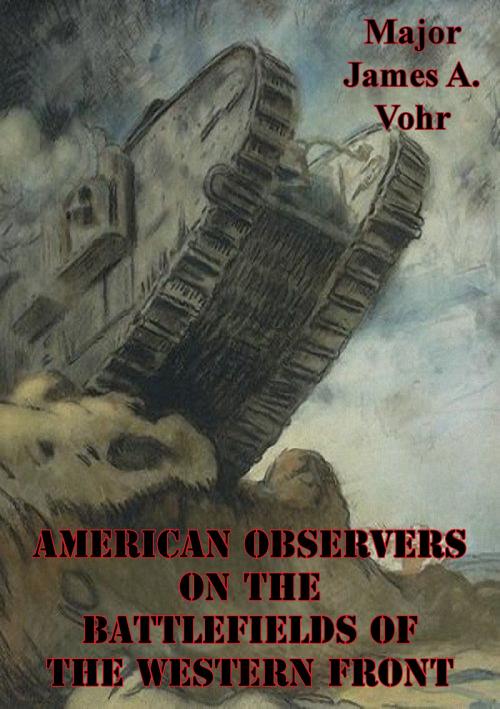American Observers On The Battlefields Of The Western Front
Nonfiction, History, Military, World War I, Germany, British| Author: | Major James A. Vohr USMC | ISBN: | 9781782897040 |
| Publisher: | Verdun Press | Publication: | August 15, 2014 |
| Imprint: | Verdun Press | Language: | English |
| Author: | Major James A. Vohr USMC |
| ISBN: | 9781782897040 |
| Publisher: | Verdun Press |
| Publication: | August 15, 2014 |
| Imprint: | Verdun Press |
| Language: | English |
Although during World War I the United States employed observers on the battlefields of the Western Front, the information they provided lacked the substance and conclusions required to evolve the tactical doctrine of the American Expeditionary Forces (AEF). In initial engagements, the AEF was largely forced to rely, with predictable negative outcome, upon outdated concepts founded largely upon the prejudices of the Army’s leadership.
In August of 1914 the United States Army and Marine Corps demonstrated strong foresight, considering the isolationist perspective of the nation, in detailing officers to the battlefields of Europe. These officers were given little guidance, but their mission was clearly to report on military actions and developments in what was becoming the largest struggle in history. A significant military development of World War I noted by the U.S. was the advance of offensive infantry tactics to cope effectively with the characteristics and lethality of the modern battlefield.
The United States, with a two and one-half year opportunity to observe tactics prior to the engagement of the AEF, arguably should have benefited from the experience of others. However, this was not the case. The AEF in its initial engagements, performed much as its European counterparts did at the onset of the war. Eventually the AEF performance improved, but only as U.S. soldiers and Marines gained personal battlefield experience.
Although during World War I the United States employed observers on the battlefields of the Western Front, the information they provided lacked the substance and conclusions required to evolve the tactical doctrine of the American Expeditionary Forces (AEF). In initial engagements, the AEF was largely forced to rely, with predictable negative outcome, upon outdated concepts founded largely upon the prejudices of the Army’s leadership.
In August of 1914 the United States Army and Marine Corps demonstrated strong foresight, considering the isolationist perspective of the nation, in detailing officers to the battlefields of Europe. These officers were given little guidance, but their mission was clearly to report on military actions and developments in what was becoming the largest struggle in history. A significant military development of World War I noted by the U.S. was the advance of offensive infantry tactics to cope effectively with the characteristics and lethality of the modern battlefield.
The United States, with a two and one-half year opportunity to observe tactics prior to the engagement of the AEF, arguably should have benefited from the experience of others. However, this was not the case. The AEF in its initial engagements, performed much as its European counterparts did at the onset of the war. Eventually the AEF performance improved, but only as U.S. soldiers and Marines gained personal battlefield experience.

![Cover of the book The Coldstream Guards, 1914-1918 Vol. I [Illustrated Edition] by Major James A. Vohr USMC](https://www.kuoky.com/images/2015/november/300x300/9781786250995-9rTG_300x.jpg)
![Cover of the book Helmet For My Pillow [Illustrated Edition] by Major James A. Vohr USMC](https://www.kuoky.com/images/2015/november/300x300/9781786252036-cMF2_300x.jpg)
![Cover of the book Merrill’s Marauders: Combined Operations In Northern Burma In 1944 [Illustrated Edition] by Major James A. Vohr USMC](https://www.kuoky.com/images/2015/november/300x300/9781786255747-FuRW_300x.jpg)
![Cover of the book THE ADMIRALTIES - Operations Of The 1st Cavalry Division 29 February - 18 May 1944 [Illustrated Edition] by Major James A. Vohr USMC](https://www.kuoky.com/images/2014/august/300x300/9781782894568-Lip5_300x.jpg)


![Cover of the book Marines In World War II - The Guadalcanal Campaign [Illustrated Edition] by Major James A. Vohr USMC](https://www.kuoky.com/images/2014/august/300x300/9781782892809-WOFP_300x.jpg)

![Cover of the book Marines In World War II - Marines At Midway [Illustrated Edition] by Major James A. Vohr USMC](https://www.kuoky.com/images/2014/august/300x300/9781782892762-fLx0_300x.jpg)


![Cover of the book Why, How, Fleet Salvage And Final Appraisal [Illustrated Edition] by Major James A. Vohr USMC](https://www.kuoky.com/images/2014/august/300x300/9781782894452-7NSe_300x.jpg)


![Cover of the book With The Trench Mortars In France [Illustrated Edition] by Major James A. Vohr USMC](https://www.kuoky.com/images/2014/june/300x300/9781782892496-2FUQ_300x.jpg)